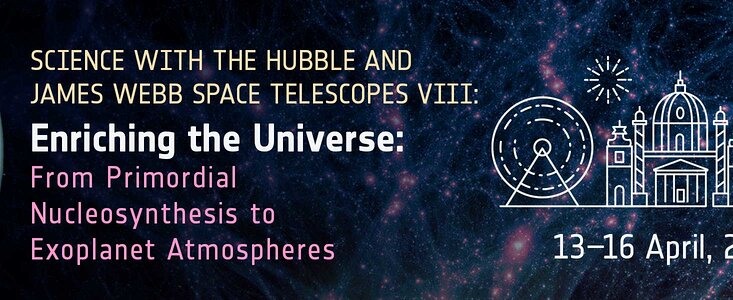sci25005 — Announcement
Announcement of the Hubble & Webb “Enriching the Universe” Conference
27 October 2025
-By Chris Evans-
I am delighted to announce the latest in the series of ESA-sponsored conferences, in collaboration with STScI, which highlight science with Hubble and Webb. The conference, “Enriching the Universe: From Primordial Nucleosynthesis to Exoplanet Atmospheres”, will be held in Vienna, Austria on 13 to 16 April 2026, shortly ahead of the 36th anniversary of Hubble’s launch.
With Hubble and Webb both in science operations, we are unlocking many of the mysteries of the Universe, in what is a tremendously exciting time for astronomy. A key topic that underpins a broad range of current research is the chemical evolution of the Universe, from the production of heavy elements in the first stars, the enrichment over successive generations of star-formation and stellar death in galaxies, and the complex chemistry in the interstellar medium and stellar environments which build-up the molecules we are now probing in exoplanet and solar system planetary atmospheres.
Hubble celebrated its landmark 35th anniversary of its launch in April. The Hubble mission, a multi-decade partnership between NASA and ESA, continues to surprise and excite us with its discoveries, and its ultraviolet-visible capabilities will remain unique for years to come. The NASA/ESA/CSA Webb mission, now into its fourth year of science operations, is also transforming the astronomical landscape with its unprecedented infrared imaging and spectroscopy. An excellent example of how the two missions are working in scientific synergy is the ongoing Rocky Worlds Director’s Discretionary Time program.
The conference science program will feature a combination of invited and contributed talks, posters, and breakout discussions with the objectives to:
- Highlight the latest Hubble and Webb results in studies of chemical evolution and nucleosynthesis over all scales, from understanding the chemistry of nearby protoplanetary disks and planetary atmospheres, to the earliest enrichment by the first galaxies and stars.
- Explore what the most pressing scientific questions are for Hubble and Webb in the coming decade, and where their unique capabilities will have the most impact.
- Identify new opportunities of where Hubble and Webb can work in concert with other space-borne and ground-based facilities, to enable new scientific breakthroughs.
Abstract submission is now open.
I look forward to seeing many of you in Vienna next year!
Contacts
ESA/HST & ESA/JWST Project Scientist
ESA Office, STScI Baltimore, USA
Email: [email protected]
About the Announcement
| Id: | sci25005 |
|---|

